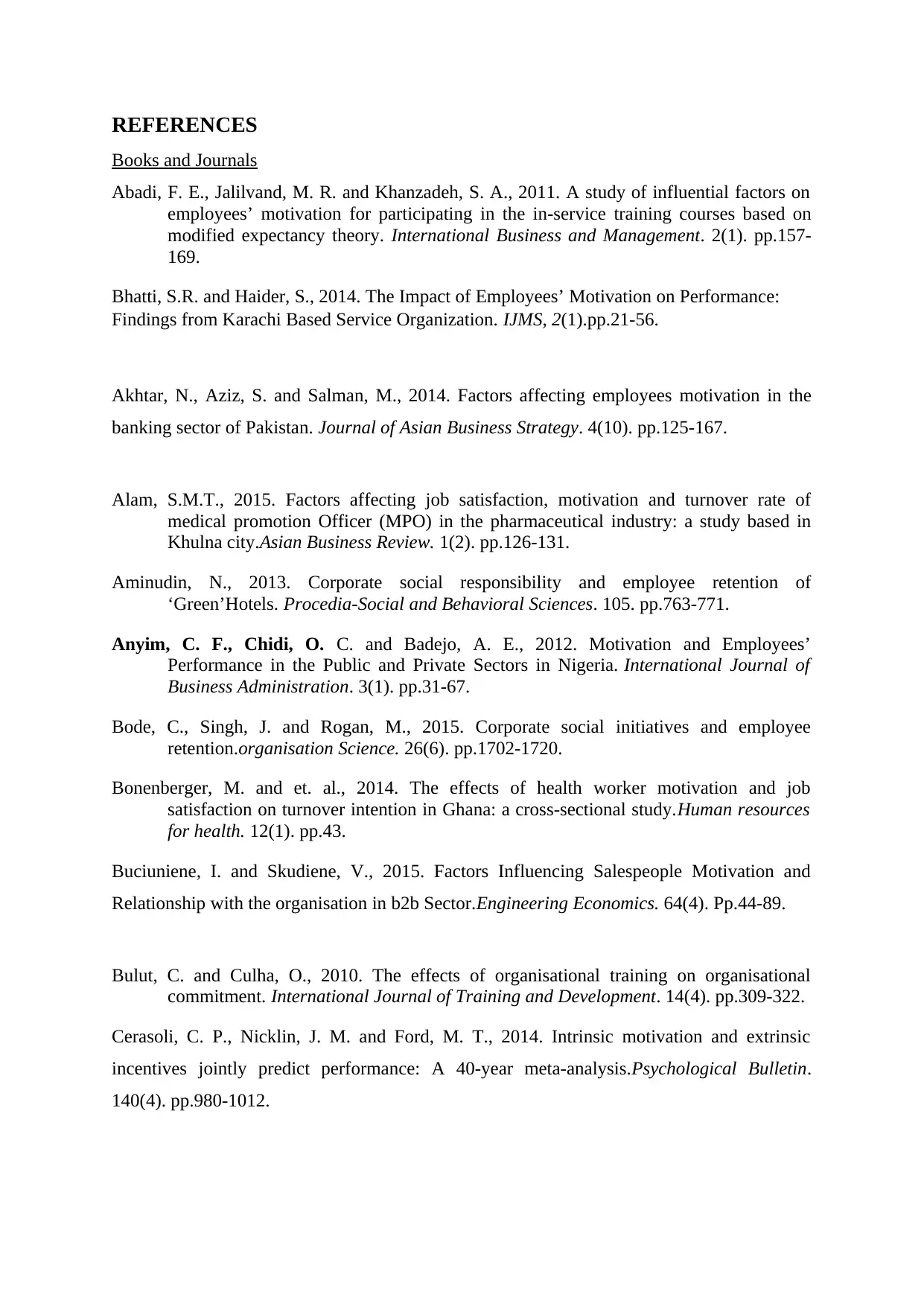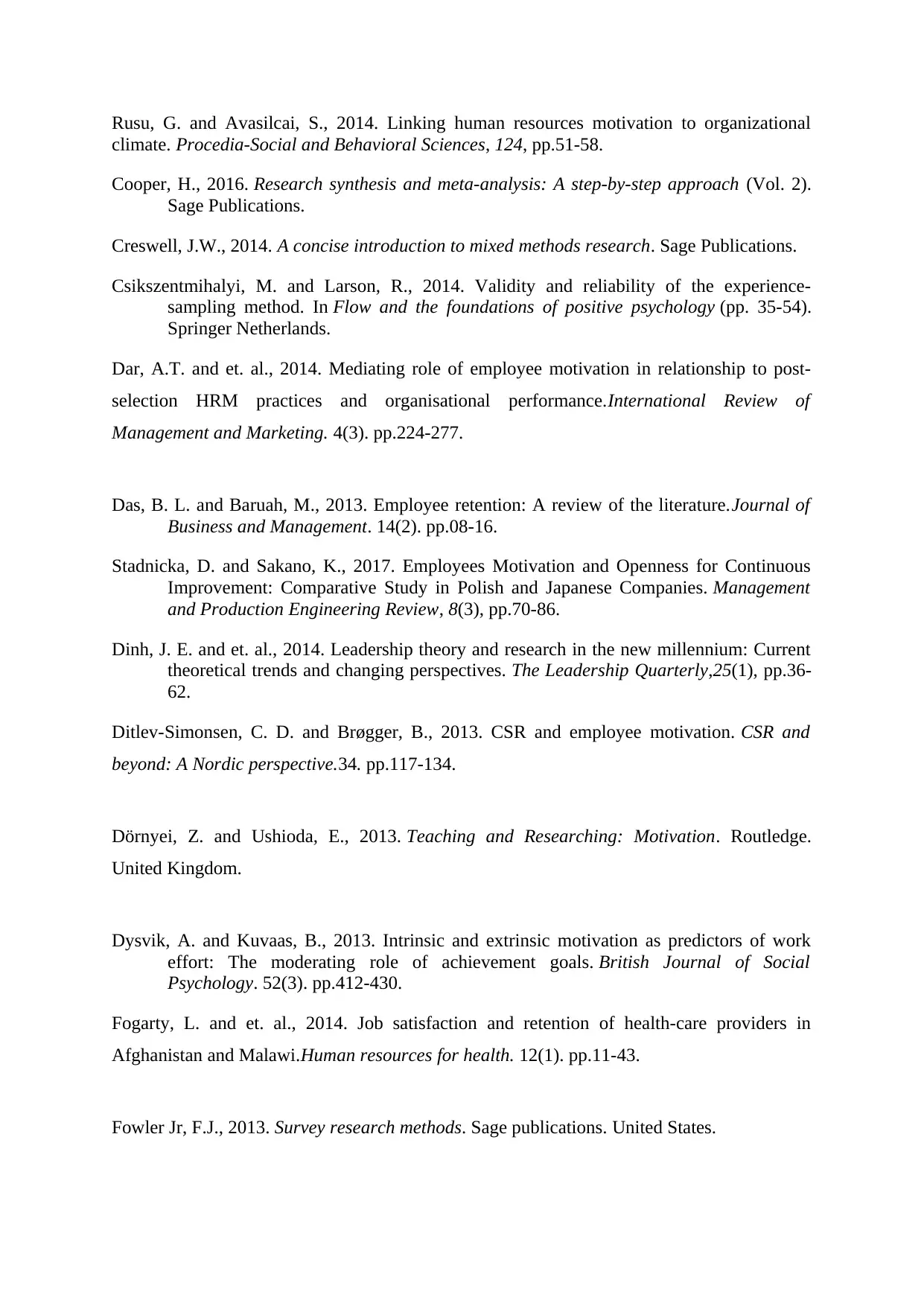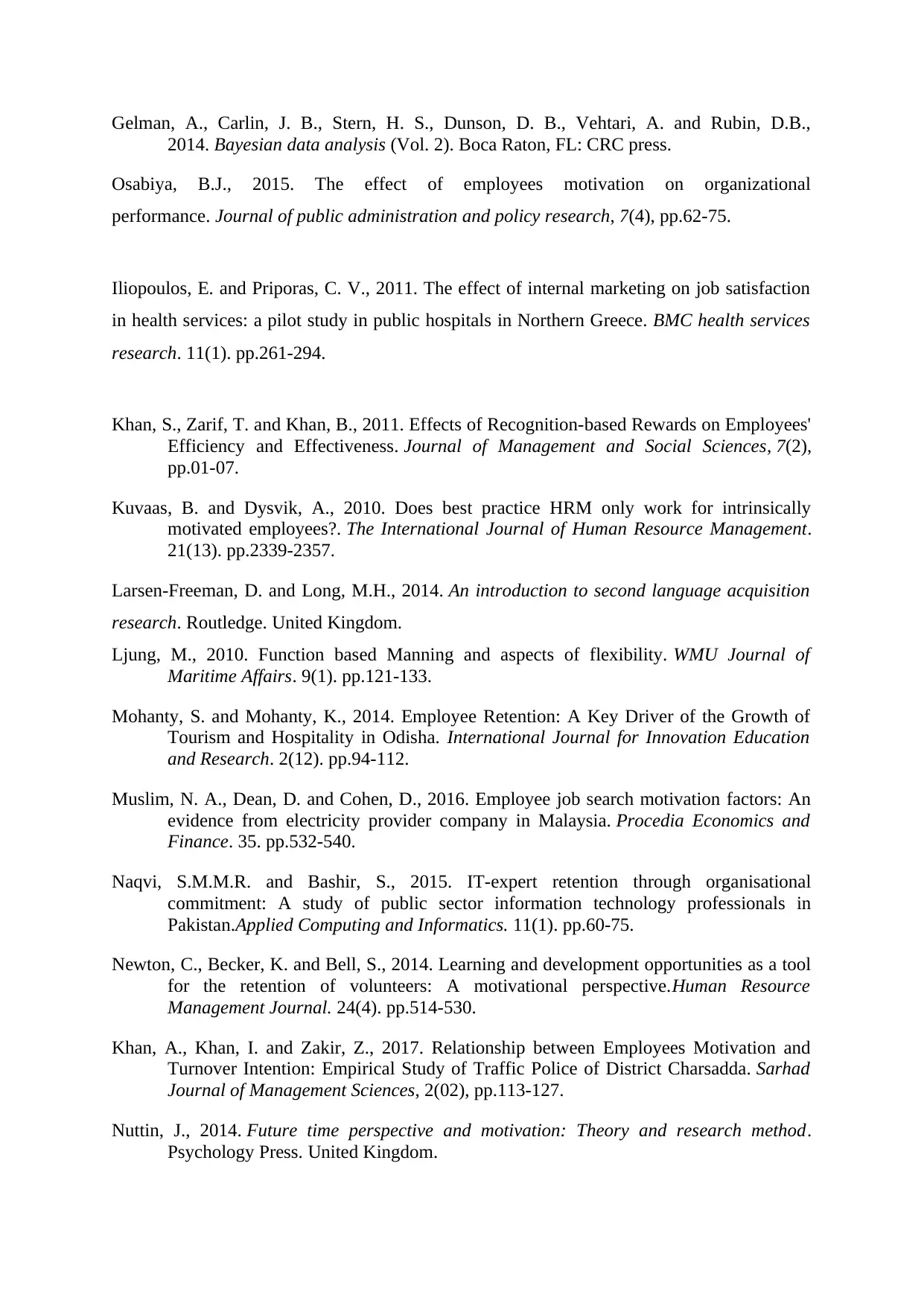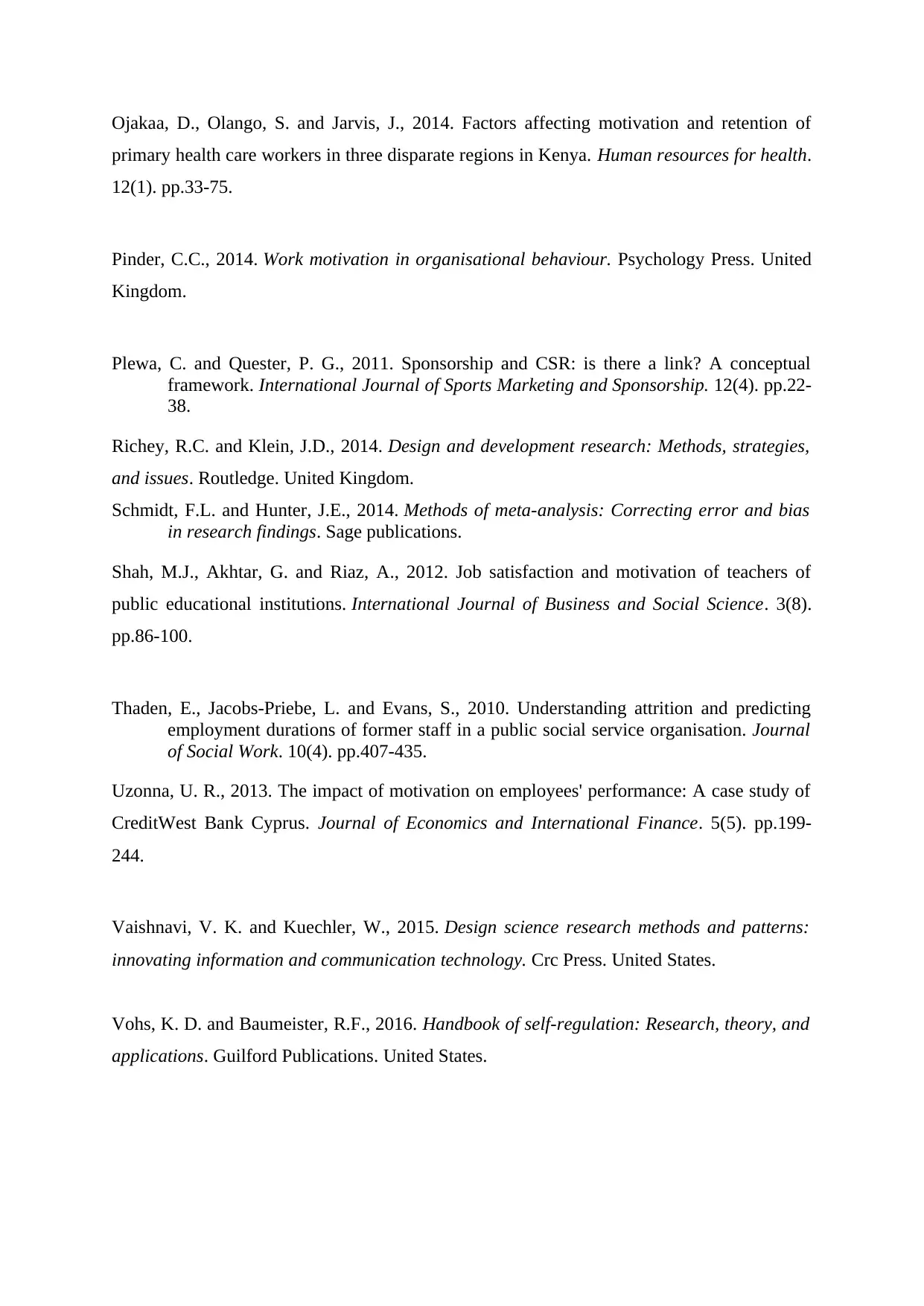Factors Affecting Employee Motivation and Retention
VerifiedAdded on 2023/04/03
|5
|1083
|263
AI Summary
This collection of research articles and journals explores the factors that affect employee motivation and retention. It covers topics such as the impact of training, job satisfaction, corporate social responsibility, and more. The articles provide valuable insights into the relationship between employee motivation and organizational performance. Whether you are a student or a professional, this collection offers valuable information on this important topic.
Contribute Materials
Your contribution can guide someone’s learning journey. Share your
documents today.

REFERENCES
Books and Journals
Abadi, F. E., Jalilvand, M. R. and Khanzadeh, S. A., 2011. A study of influential factors on
employees’ motivation for participating in the in-service training courses based on
modified expectancy theory. International Business and Management. 2(1). pp.157-
169.
Bhatti, S.R. and Haider, S., 2014. The Impact of Employees’ Motivation on Performance:
Findings from Karachi Based Service Organization. IJMS, 2(1).pp.21-56.
Akhtar, N., Aziz, S. and Salman, M., 2014. Factors affecting employees motivation in the
banking sector of Pakistan. Journal of Asian Business Strategy. 4(10). pp.125-167.
Alam, S.M.T., 2015. Factors affecting job satisfaction, motivation and turnover rate of
medical promotion Officer (MPO) in the pharmaceutical industry: a study based in
Khulna city.Asian Business Review. 1(2). pp.126-131.
Aminudin, N., 2013. Corporate social responsibility and employee retention of
‘Green’Hotels. Procedia-Social and Behavioral Sciences. 105. pp.763-771.
Anyim, C. F., Chidi, O. C. and Badejo, A. E., 2012. Motivation and Employees’
Performance in the Public and Private Sectors in Nigeria. International Journal of
Business Administration. 3(1). pp.31-67.
Bode, C., Singh, J. and Rogan, M., 2015. Corporate social initiatives and employee
retention.organisation Science. 26(6). pp.1702-1720.
Bonenberger, M. and et. al., 2014. The effects of health worker motivation and job
satisfaction on turnover intention in Ghana: a cross-sectional study.Human resources
for health. 12(1). pp.43.
Buciuniene, I. and Skudiene, V., 2015. Factors Influencing Salespeople Motivation and
Relationship with the organisation in b2b Sector.Engineering Economics. 64(4). Pp.44-89.
Bulut, C. and Culha, O., 2010. The effects of organisational training on organisational
commitment. International Journal of Training and Development. 14(4). pp.309-322.
Cerasoli, C. P., Nicklin, J. M. and Ford, M. T., 2014. Intrinsic motivation and extrinsic
incentives jointly predict performance: A 40-year meta-analysis.Psychological Bulletin.
140(4). pp.980-1012.
Books and Journals
Abadi, F. E., Jalilvand, M. R. and Khanzadeh, S. A., 2011. A study of influential factors on
employees’ motivation for participating in the in-service training courses based on
modified expectancy theory. International Business and Management. 2(1). pp.157-
169.
Bhatti, S.R. and Haider, S., 2014. The Impact of Employees’ Motivation on Performance:
Findings from Karachi Based Service Organization. IJMS, 2(1).pp.21-56.
Akhtar, N., Aziz, S. and Salman, M., 2014. Factors affecting employees motivation in the
banking sector of Pakistan. Journal of Asian Business Strategy. 4(10). pp.125-167.
Alam, S.M.T., 2015. Factors affecting job satisfaction, motivation and turnover rate of
medical promotion Officer (MPO) in the pharmaceutical industry: a study based in
Khulna city.Asian Business Review. 1(2). pp.126-131.
Aminudin, N., 2013. Corporate social responsibility and employee retention of
‘Green’Hotels. Procedia-Social and Behavioral Sciences. 105. pp.763-771.
Anyim, C. F., Chidi, O. C. and Badejo, A. E., 2012. Motivation and Employees’
Performance in the Public and Private Sectors in Nigeria. International Journal of
Business Administration. 3(1). pp.31-67.
Bode, C., Singh, J. and Rogan, M., 2015. Corporate social initiatives and employee
retention.organisation Science. 26(6). pp.1702-1720.
Bonenberger, M. and et. al., 2014. The effects of health worker motivation and job
satisfaction on turnover intention in Ghana: a cross-sectional study.Human resources
for health. 12(1). pp.43.
Buciuniene, I. and Skudiene, V., 2015. Factors Influencing Salespeople Motivation and
Relationship with the organisation in b2b Sector.Engineering Economics. 64(4). Pp.44-89.
Bulut, C. and Culha, O., 2010. The effects of organisational training on organisational
commitment. International Journal of Training and Development. 14(4). pp.309-322.
Cerasoli, C. P., Nicklin, J. M. and Ford, M. T., 2014. Intrinsic motivation and extrinsic
incentives jointly predict performance: A 40-year meta-analysis.Psychological Bulletin.
140(4). pp.980-1012.
Secure Best Marks with AI Grader
Need help grading? Try our AI Grader for instant feedback on your assignments.

Rusu, G. and Avasilcai, S., 2014. Linking human resources motivation to organizational
climate. Procedia-Social and Behavioral Sciences, 124, pp.51-58.
Cooper, H., 2016. Research synthesis and meta-analysis: A step-by-step approach (Vol. 2).
Sage Publications.
Creswell, J.W., 2014. A concise introduction to mixed methods research. Sage Publications.
Csikszentmihalyi, M. and Larson, R., 2014. Validity and reliability of the experience-
sampling method. In Flow and the foundations of positive psychology (pp. 35-54).
Springer Netherlands.
Dar, A.T. and et. al., 2014. Mediating role of employee motivation in relationship to post-
selection HRM practices and organisational performance.International Review of
Management and Marketing. 4(3). pp.224-277.
Das, B. L. and Baruah, M., 2013. Employee retention: A review of the literature.Journal of
Business and Management. 14(2). pp.08-16.
Stadnicka, D. and Sakano, K., 2017. Employees Motivation and Openness for Continuous
Improvement: Comparative Study in Polish and Japanese Companies. Management
and Production Engineering Review, 8(3), pp.70-86.
Dinh, J. E. and et. al., 2014. Leadership theory and research in the new millennium: Current
theoretical trends and changing perspectives. The Leadership Quarterly,25(1), pp.36-
62.
Ditlev-Simonsen, C. D. and Brøgger, B., 2013. CSR and employee motivation. CSR and
beyond: A Nordic perspective.34. pp.117-134.
Dörnyei, Z. and Ushioda, E., 2013. Teaching and Researching: Motivation. Routledge.
United Kingdom.
Dysvik, A. and Kuvaas, B., 2013. Intrinsic and extrinsic motivation as predictors of work
effort: The moderating role of achievement goals. British Journal of Social
Psychology. 52(3). pp.412-430.
Fogarty, L. and et. al., 2014. Job satisfaction and retention of health-care providers in
Afghanistan and Malawi.Human resources for health. 12(1). pp.11-43.
Fowler Jr, F.J., 2013. Survey research methods. Sage publications. United States.
climate. Procedia-Social and Behavioral Sciences, 124, pp.51-58.
Cooper, H., 2016. Research synthesis and meta-analysis: A step-by-step approach (Vol. 2).
Sage Publications.
Creswell, J.W., 2014. A concise introduction to mixed methods research. Sage Publications.
Csikszentmihalyi, M. and Larson, R., 2014. Validity and reliability of the experience-
sampling method. In Flow and the foundations of positive psychology (pp. 35-54).
Springer Netherlands.
Dar, A.T. and et. al., 2014. Mediating role of employee motivation in relationship to post-
selection HRM practices and organisational performance.International Review of
Management and Marketing. 4(3). pp.224-277.
Das, B. L. and Baruah, M., 2013. Employee retention: A review of the literature.Journal of
Business and Management. 14(2). pp.08-16.
Stadnicka, D. and Sakano, K., 2017. Employees Motivation and Openness for Continuous
Improvement: Comparative Study in Polish and Japanese Companies. Management
and Production Engineering Review, 8(3), pp.70-86.
Dinh, J. E. and et. al., 2014. Leadership theory and research in the new millennium: Current
theoretical trends and changing perspectives. The Leadership Quarterly,25(1), pp.36-
62.
Ditlev-Simonsen, C. D. and Brøgger, B., 2013. CSR and employee motivation. CSR and
beyond: A Nordic perspective.34. pp.117-134.
Dörnyei, Z. and Ushioda, E., 2013. Teaching and Researching: Motivation. Routledge.
United Kingdom.
Dysvik, A. and Kuvaas, B., 2013. Intrinsic and extrinsic motivation as predictors of work
effort: The moderating role of achievement goals. British Journal of Social
Psychology. 52(3). pp.412-430.
Fogarty, L. and et. al., 2014. Job satisfaction and retention of health-care providers in
Afghanistan and Malawi.Human resources for health. 12(1). pp.11-43.
Fowler Jr, F.J., 2013. Survey research methods. Sage publications. United States.

Gelman, A., Carlin, J. B., Stern, H. S., Dunson, D. B., Vehtari, A. and Rubin, D.B.,
2014. Bayesian data analysis (Vol. 2). Boca Raton, FL: CRC press.
Osabiya, B.J., 2015. The effect of employees motivation on organizational
performance. Journal of public administration and policy research, 7(4), pp.62-75.
Iliopoulos, E. and Priporas, C. V., 2011. The effect of internal marketing on job satisfaction
in health services: a pilot study in public hospitals in Northern Greece. BMC health services
research. 11(1). pp.261-294.
Khan, S., Zarif, T. and Khan, B., 2011. Effects of Recognition-based Rewards on Employees'
Efficiency and Effectiveness. Journal of Management and Social Sciences, 7(2),
pp.01-07.
Kuvaas, B. and Dysvik, A., 2010. Does best practice HRM only work for intrinsically
motivated employees?. The International Journal of Human Resource Management.
21(13). pp.2339-2357.
Larsen-Freeman, D. and Long, M.H., 2014. An introduction to second language acquisition
research. Routledge. United Kingdom.
Ljung, M., 2010. Function based Manning and aspects of flexibility. WMU Journal of
Maritime Affairs. 9(1). pp.121-133.
Mohanty, S. and Mohanty, K., 2014. Employee Retention: A Key Driver of the Growth of
Tourism and Hospitality in Odisha. International Journal for Innovation Education
and Research. 2(12). pp.94-112.
Muslim, N. A., Dean, D. and Cohen, D., 2016. Employee job search motivation factors: An
evidence from electricity provider company in Malaysia. Procedia Economics and
Finance. 35. pp.532-540.
Naqvi, S.M.M.R. and Bashir, S., 2015. IT-expert retention through organisational
commitment: A study of public sector information technology professionals in
Pakistan.Applied Computing and Informatics. 11(1). pp.60-75.
Newton, C., Becker, K. and Bell, S., 2014. Learning and development opportunities as a tool
for the retention of volunteers: A motivational perspective.Human Resource
Management Journal. 24(4). pp.514-530.
Khan, A., Khan, I. and Zakir, Z., 2017. Relationship between Employees Motivation and
Turnover Intention: Empirical Study of Traffic Police of District Charsadda. Sarhad
Journal of Management Sciences, 2(02), pp.113-127.
Nuttin, J., 2014. Future time perspective and motivation: Theory and research method.
Psychology Press. United Kingdom.
2014. Bayesian data analysis (Vol. 2). Boca Raton, FL: CRC press.
Osabiya, B.J., 2015. The effect of employees motivation on organizational
performance. Journal of public administration and policy research, 7(4), pp.62-75.
Iliopoulos, E. and Priporas, C. V., 2011. The effect of internal marketing on job satisfaction
in health services: a pilot study in public hospitals in Northern Greece. BMC health services
research. 11(1). pp.261-294.
Khan, S., Zarif, T. and Khan, B., 2011. Effects of Recognition-based Rewards on Employees'
Efficiency and Effectiveness. Journal of Management and Social Sciences, 7(2),
pp.01-07.
Kuvaas, B. and Dysvik, A., 2010. Does best practice HRM only work for intrinsically
motivated employees?. The International Journal of Human Resource Management.
21(13). pp.2339-2357.
Larsen-Freeman, D. and Long, M.H., 2014. An introduction to second language acquisition
research. Routledge. United Kingdom.
Ljung, M., 2010. Function based Manning and aspects of flexibility. WMU Journal of
Maritime Affairs. 9(1). pp.121-133.
Mohanty, S. and Mohanty, K., 2014. Employee Retention: A Key Driver of the Growth of
Tourism and Hospitality in Odisha. International Journal for Innovation Education
and Research. 2(12). pp.94-112.
Muslim, N. A., Dean, D. and Cohen, D., 2016. Employee job search motivation factors: An
evidence from electricity provider company in Malaysia. Procedia Economics and
Finance. 35. pp.532-540.
Naqvi, S.M.M.R. and Bashir, S., 2015. IT-expert retention through organisational
commitment: A study of public sector information technology professionals in
Pakistan.Applied Computing and Informatics. 11(1). pp.60-75.
Newton, C., Becker, K. and Bell, S., 2014. Learning and development opportunities as a tool
for the retention of volunteers: A motivational perspective.Human Resource
Management Journal. 24(4). pp.514-530.
Khan, A., Khan, I. and Zakir, Z., 2017. Relationship between Employees Motivation and
Turnover Intention: Empirical Study of Traffic Police of District Charsadda. Sarhad
Journal of Management Sciences, 2(02), pp.113-127.
Nuttin, J., 2014. Future time perspective and motivation: Theory and research method.
Psychology Press. United Kingdom.

Ojakaa, D., Olango, S. and Jarvis, J., 2014. Factors affecting motivation and retention of
primary health care workers in three disparate regions in Kenya. Human resources for health.
12(1). pp.33-75.
Pinder, C.C., 2014. Work motivation in organisational behaviour. Psychology Press. United
Kingdom.
Plewa, C. and Quester, P. G., 2011. Sponsorship and CSR: is there a link? A conceptual
framework. International Journal of Sports Marketing and Sponsorship. 12(4). pp.22-
38.
Richey, R.C. and Klein, J.D., 2014. Design and development research: Methods, strategies,
and issues. Routledge. United Kingdom.
Schmidt, F.L. and Hunter, J.E., 2014. Methods of meta-analysis: Correcting error and bias
in research findings. Sage publications.
Shah, M.J., Akhtar, G. and Riaz, A., 2012. Job satisfaction and motivation of teachers of
public educational institutions. International Journal of Business and Social Science. 3(8).
pp.86-100.
Thaden, E., Jacobs-Priebe, L. and Evans, S., 2010. Understanding attrition and predicting
employment durations of former staff in a public social service organisation. Journal
of Social Work. 10(4). pp.407-435.
Uzonna, U. R., 2013. The impact of motivation on employees' performance: A case study of
CreditWest Bank Cyprus. Journal of Economics and International Finance. 5(5). pp.199-
244.
Vaishnavi, V. K. and Kuechler, W., 2015. Design science research methods and patterns:
innovating information and communication technology. Crc Press. United States.
Vohs, K. D. and Baumeister, R.F., 2016. Handbook of self-regulation: Research, theory, and
applications. Guilford Publications. United States.
primary health care workers in three disparate regions in Kenya. Human resources for health.
12(1). pp.33-75.
Pinder, C.C., 2014. Work motivation in organisational behaviour. Psychology Press. United
Kingdom.
Plewa, C. and Quester, P. G., 2011. Sponsorship and CSR: is there a link? A conceptual
framework. International Journal of Sports Marketing and Sponsorship. 12(4). pp.22-
38.
Richey, R.C. and Klein, J.D., 2014. Design and development research: Methods, strategies,
and issues. Routledge. United Kingdom.
Schmidt, F.L. and Hunter, J.E., 2014. Methods of meta-analysis: Correcting error and bias
in research findings. Sage publications.
Shah, M.J., Akhtar, G. and Riaz, A., 2012. Job satisfaction and motivation of teachers of
public educational institutions. International Journal of Business and Social Science. 3(8).
pp.86-100.
Thaden, E., Jacobs-Priebe, L. and Evans, S., 2010. Understanding attrition and predicting
employment durations of former staff in a public social service organisation. Journal
of Social Work. 10(4). pp.407-435.
Uzonna, U. R., 2013. The impact of motivation on employees' performance: A case study of
CreditWest Bank Cyprus. Journal of Economics and International Finance. 5(5). pp.199-
244.
Vaishnavi, V. K. and Kuechler, W., 2015. Design science research methods and patterns:
innovating information and communication technology. Crc Press. United States.
Vohs, K. D. and Baumeister, R.F., 2016. Handbook of self-regulation: Research, theory, and
applications. Guilford Publications. United States.
Secure Best Marks with AI Grader
Need help grading? Try our AI Grader for instant feedback on your assignments.

1 out of 5
Related Documents
Your All-in-One AI-Powered Toolkit for Academic Success.
+13062052269
info@desklib.com
Available 24*7 on WhatsApp / Email
![[object Object]](/_next/static/media/star-bottom.7253800d.svg)
Unlock your academic potential
© 2024 | Zucol Services PVT LTD | All rights reserved.





